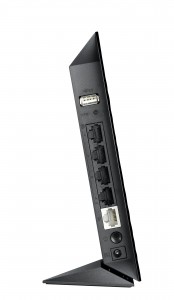ASUS announced the feature-rich RT-N14U wireless N300 router, priced at just US$70 for wide appeal to home users. The RT-N14U is capable of 300Mbit/s802.11n Wi-Fi and supports the ASUS AiCloud platform with enhanced specifications relative to its price point.Using ASUS AiCloud, customers can sync, share, stream, and access content from wherever an internet connection is available. The RT-N14U features a USB 2.0 port to enable plug-n-play connections with 3G/4Gadapters, external storage, and printers. It can easily act as a printer and FTP server as well as a cellular network failover backup for LAN and WAN connections. ASUS software features include the ASUSWRT interface for 30-second setup and easy network management, Download Master remote-manageddownloads, parental controls, and guest access.
About the launch of Asus RT-N14U Value Router Mr. Vinay Shetty – Country Head – Component Business, ASUS (India) said, “This latest ASUS RT-N14U Value Router has highly intuitive ASUSWRT interface that allows 30-second setup and easy network monitoring and management. It also has ASUS AiCloud, that offers complete cloud access with a host of features while maintaining strict security and privacy. Customers can sync, share, stream, and access content located on connected USB storage from any location, using the RT-N14U as their home cloud server.”
ASUS AiCloud is integrated into specific versions of the ASUS WRT interface, and requires routers with a USB port. Previously only much pricier high-end ASUS routers were configured for ASUS AiCloud, and the RT-N14U is significant in bringing support for the service to a much more affordable segment.ASUS AiCloud offers complete cloud access with a host of features while maintaining strict security and privacy. Customers can sync, share, stream, and access content located on connected USB storage from any location, using the RT-N14U as their home cloud server. ASUS AiCloud is compatible with iOS, Android, and Windows PC.It merges seamlessly with the ASUS Web Storage service and offers link-based sharing. Customers can send a link for other users to download shared content from, which is much faster than navigating a public cloud interface. This can be done via email, SMS, or popular applications such as WhatsApp and LINE.





